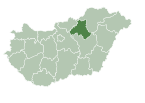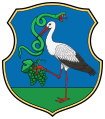|
Markaz, Hungary
 Markaz is a village in Heves County, Hungary, under the Markaz Lake in the Mátra mountain ranges. As of 2022 census, it has a population of 1698 (see Demographics). The village located 13.8 km from (Nr. 85) Vámosgyörk–Gyöngyös railway line, 10.3 km from the main road 3 and 18.1 km from the M3 motorway. The closest train station with public transport in Gyöngyös. HistoryThe name of the village is first mentioned in the 1332-37 papal tithe list. The name of the settlement was probably named by the Kabars, who called it as center (markaz). However the old church of the village, was St. Mark's church. The first well-known owners of the village were the Kompolti family, who built a castle on the hill above the village. In 1522 the Országh family became the landlord, but in 1544 the Ottomans destroyed the castle and the population fled. The remains of the castle are still visible to this day. In the 17th century, the area was owned by the Haller, Nyáry, Petrovay, Huszár, Szunyogh and Bossányi families. In 1742 Gáspár Bossányi reinstated the village with 40 most of the Slovak families. In 1770 were 560, in 1803 730 and in 1851 900 people lived in Markaz. Already in the 15th century, the population lived from viticulture. In the second half of the 18th century and the end of the 19th century, the grapes were reinstalled, after the destruction of the phylloxera epidemic in 1885. The 19th century village's life at that time is presented by the folk museum. The winemaking was carried out after 1949 in cooperative form, but nowadays only a few families working in wineries. Today's church was built in 1911 after the former church collapsed. The Markaz Lake was created in 1968, which is used for sailing, surfing and fishing.[1] DemographicsAccording the 2022 census, 90.5% of the population were of Hungarian ethnicity, 1.9% were Gypsies, 0.5% were Germans and 9.4% were did not wish to answer. The religious distribution was as follows: 43.8% Roman Catholic, 2.9% Calvinist, 0.6% Greek Catholic, 9.0% non-denominational, and 39.7% did not wish to answer. The Gypsies have a local nationality government. 48 people live beside of the lake and 17 in other outskirts.[2] Population by years:[3]
PoliticsMayors since 1990:
References
|
||||||||||||||||||||||||||||||||||||||||||||||||||||||||||||||||||||||||||||||||||




